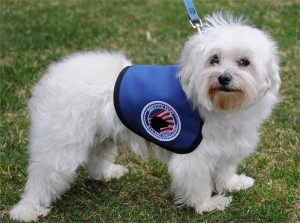 Service animals are a necessity for many individuals with a mental or physical disability who need assistance navigating daily life. Under the Americans with Disabilities Act (ADA) and state laws, no business owner providing public accommodations can discriminate against or refuse service to an individual because of the use of a service animal.
Service animals are a necessity for many individuals with a mental or physical disability who need assistance navigating daily life. Under the Americans with Disabilities Act (ADA) and state laws, no business owner providing public accommodations can discriminate against or refuse service to an individual because of the use of a service animal.
Pursuant to federal law, a business owner can only ask two questions regarding a service animal: 1) Is it a service animal? 2) What is it trained to do? The business owner cannot ask about the nature of the individual’s disability or request that the individual prove the service animal is trained to do a particular task. The owner must allow the service animal into the business unless the animal is out of the control of the owner or not housetrained.
These necessary restrictions are to protect individuals with disabilities, but can lead some to abuse the system. Sometimes, individuals attempt to bring their pets into businesses claiming they are service animals. While this is insensitive, offensive and unethical, in many states this is not a crime. As of July 1, 2015, in Florida, it is a crime. It is a second degree misdemeanor to represent an animal as a service animal when it is not actually a service animal.
In Florida, a service animal is a specially trained dog or miniature horse trained to assist an individual with a disability. Misrepresentation of a service animal is punishable by up to sixty days in jail, a five hundred dollar fine, and thirty hours of community service with an organization that provides services to individuals with disabilities.
While the ADA limits the questions that can be asked about a service animal, a fake service animal can often be identified by its behavior. A service animal usually wears special identification and is almost always in a harness, guide handle or leash. Fake service animals are usually not as well behaved as service animals. They may jump, bark, or stray from their owner. They may attempt to interact with people other than the owner, including invading the personal space of those around them. They may also fail to respond to its owner’s commands.
 The owner of a pet who is misrepresenting it as a service animal may also behave differently than a person with a disability who relies on a service dog. They may allow their pet to interact or attempt to interact with others. They may feed the pet from the table. They may feed them table scraps. They may allow them to sniff merchandise or put their paws on shelves. They may even allow them to sit next to them at the table or in a booth.
The owner of a pet who is misrepresenting it as a service animal may also behave differently than a person with a disability who relies on a service dog. They may allow their pet to interact or attempt to interact with others. They may feed the pet from the table. They may feed them table scraps. They may allow them to sniff merchandise or put their paws on shelves. They may even allow them to sit next to them at the table or in a booth.
Florida’s new law is a welcome protection for individuals with disabilities who need their service animals to navigate daily life and protect them. While it may not stop all who may misrepresent their pets as services animals, it will provide a deterrent against this misrepresentation and punishment for those who do.

